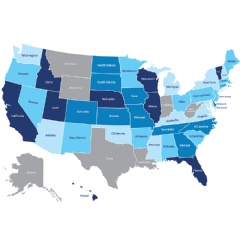CTA’s Gary Shapiro Testifies on AI
Gary Shapiro, president and CEO, CTA, testified on April 18, before the House Oversight Committee on how the government and private sector can address the challenges of artificial intelligence (AI). This was the third and final hearing in a series on AI for the Subcommittee on Information Technology series.
“As AI becomes capable of doing more complex tasks, it will revolutionize even more aspects of our lives,” Shapiro said in his opening testimony. “It will also raise an increasing number of questions about jobs, bias, cybersecurity and other serious issues.”
Through the hearing, Shapiro and the other witnesses – experts from OpenAI, Partnership for AI, and Harvard University – discussed AI’s future impact on ethics, economics, privacy and transparency. Shapiro explained how AI will solve fundamental human problems within health care and safety, but also open the door to new types of biases, cybersecurity problems, and making certain jobs obsolete. Shapiro also highlighted CTA’s own efforts to prepare for an AI-driven world, such as hiring its first vice president of U.S. jobs and creating the 21st Century Workforce Council.
“There is no single policy decision or government action that will guarantee America’s leadership in artificial intelligence,” Shapiro said. “But we are confident that we can work together on a broad range of policies that will put us in the best possible position to lead well into the future and deliver the innovative technologies that will continue to change our lives for the better.”
Tech Workforce: How fast are the states’ tech workforces growing?CTA produces two reports that evaluate innovation-friendly policies in the U.S. and abroad. The U.S. Innovation Scorecard – now in its fourth year – evaluates all 50 states on 12 indicators including undergraduates earning STEM degrees and laws governing emerging technologies such as drones, self-driving cars, ridesharing and short-term rentals.
Twelve states, including one first-time winner, are now the best places in the country to create jobs and launch businesses involving emerging technologies. Arizona, Colorado, Delaware, Kansas, Maryland, Massachusetts, Michigan, New Hampshire, Utah, Virginia and Washington repeat as Innovation Champions – the Scorecard’s top ranking – and Pennsylvania debuts among the top tier.
“In our fourth year of the Scorecard, the trends are clear: state governments that embrace disruptive technologies early are the best at delivering the policies that enable our nation’s innovators to flourish,” said CTA’s Shapiro. “When we started this report, ridesharing platforms including Lyft and Uber were still finding their way with state governments. But now, most states have legal frameworks for these services. And more states are adopting policies that allow emerging technologies such as self-driving vehicles and drones to develop and flourish.” To explore the full report and read state-by-state profiles, visit USinnovationscorecard.com.
( Press Release Image: https://photos.webwire.com/prmedia/6/226929/226929-1.jpg )
WebWireID226929
This news content was configured by WebWire editorial staff. Linking is permitted.
News Release Distribution and Press Release Distribution Services Provided by WebWire.
